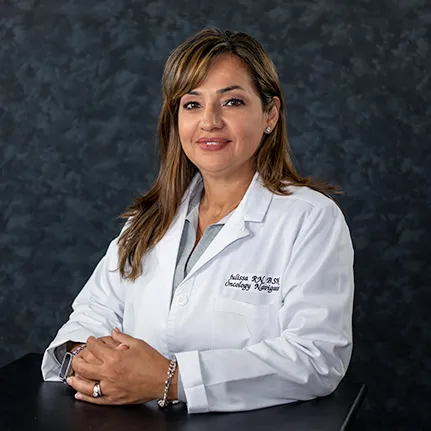Breathe easier knowing sooner. This Lung Cancer Awareness Month, take action and schedule a low-dose CT scan, the simple test that could save your life.
$99, Free for military, veterans and first responders.

Breathe Easier with Expert Lung Care
At Texas Health Huguley Hospital, we’re committed to helping you protect your lung health through early detection, advanced technology and a dedicated lung navigator to walk you through every step of the journey. Whether you’re looking to understand your risk, explore screening options or learn the warning signs of lung cancer, our comprehensive lung care services are here to guide you every step of the way. Your lungs matter, let us help you take a proactive approach to your respiratory health.
Need help finding us? Click here to utilize our interactive campus map.

Meet Your Lung Nurse Navigator
Our dedicated Lung Nurse Navigator, Julissa Escamilla BSN, is here to walk beside you every step of the way. From scheduling screenings to connecting you with the right specialists, they’re your go-to resource for support and guidance throughout your lung health journey. Think of them as your personal advocate, making the process easier, answering your questions and helping you feel confident in your next steps.
The navigator is available Monday through Friday, 8 am to 5 pm.
Interested in quitting or reducing your tobacco use? Live Tobacco Free is a 4-week program offered by Tarrant County Public Health to help you quit using tobacco products like cigarettes, cigars, smokeless tobacco and e-cigs.
Reducing Your Risks
While doctors cannot always explain why one person develops lung cancer and another does not, there are certain risk factors that research has shown to increase a person's chance of developing lung cancer.
Included among these risk factors are:
- Tobacco smoke
- Radon
- Asbestos and other carcinogens
- Air pollution
- Family or personal history of lung cancer
- Radiation therapy
- Age(s) 65 and older
- History of lung disease
- Diet
- Low-Dose CT Screening Criteria
-
The criteria for LDCT screening are as follows:
- Age: Adults aged 50 to 80 years.
- Smoking History: A 20 pack-year smoking history (one pack-year is smoking an average of 20 cigarettes per day for one year).
- Current Smoking: Currently smoking or having quit within the past 15 years.
- Health Limitations: No serious health problems that will likely limit life expectancy or the ability to have lung surgery.
These criteria are based on the recommendations from the US Preventive Services Task Force and the American Cancer Society, which aim to reduce the risk of lung cancer and improve treatment outcomes.
- Signs & Symptoms
-
Lung cancer may not cause any symptoms, especially in the early stages of the disease.
Therefore, it may first be detected on X-rays. CT scans or other tests are being done to check for another condition.
The following signs and symptoms of non-small cell and small cell lung cancer may also be caused by many other conditions and are not specific to lung cancer. Talk to your doctor if you have any of the following.How can lung cancer affect breathing?
- The tumor can block off an airway and interfere with breathing. When an airway is blocked, mucus trapped in the lung may become infected, resulting in pneumonia. Lung cancer can also cause fluid to build up in the space between the lungs and the ribs, causing shortness of breath.
Coughing symptoms:
- A cough that gets worse or does not go away
- Coughing up blood
Chest symptoms:
- Breathing trouble, such as shortness of breath
- New wheezing when you breathe
- Ache or pain in your chest, upper back or shoulder that doesn't go away and may get worse with deep breathing
- A hoarse voice
- Frequent respiratory tract infections such as pneumonia or bronchitis
General physical symptoms:
- Feeling unusually tired all the time
- Weight loss with no known cause and loss of appetite
- Trouble swallowing
- Swelling in the face and or veins in the neck
Lung cancer that spreads may cause other symptoms, like pain in the back or other bones or weakness in the arms or legs. If it spreads to the brain, it may cause headaches, seizures, dizziness, memory problems or speech difficulties.Small cell lung cancer patients may also present with unique symptoms because small cell lung cancer tumors secrete hormones. These symptoms are called paraneoplastic syndromes. An example of these is SIADH, a syndrome of inappropriate anti-diuretic hormone secretion, which can lead to low blood sodium levels because the body retains fluid.
- Specialty Programs
-
Our specialty programs include medical, radiation and surgical oncology, as well as specialized programs for specific types of cancer. Patients in these programs may receive care from:
- Diagnostic radiologists
- Interventional radiologists
- Radiation oncologists
- Palliative care doctors
- Thoracic surgeons
- Pulmonary rehab
- Respiratory therapists
- Medical oncologists
- Pathologists
- Smoking cessation program
- Medical Services and Technologies
-
We offer additional services and technologies to evaluate and treat diagnoses, including:
- Fine needle aspiration
- Genomic testing
- lon robatic bronchoscopy
- Sputum cytology
- Thoracentesis
- Thoracotomy
Surgical Specialists
Our surgical specialists provide minimally invasive surgical services:- Robotic-assisted thoracic surgery
- Video-assisted thoracic surgery or thoracoscopy
- Lobectomy
- Pneumonectomy
- Segmentectomy or wedge resection

Understand How GERD May Be Affecting Your Lung Health
Gastroesophageal reflux disease (GERD) is more than a digestive issue. It can contribute to respiratory problems such as chronic cough, asthma, and lung irritation.
Recognizing your risk for GERD is an important step in protecting your pulmonary health. Simple changes like modifying your diet, eating smaller portions, or increasing physical activity can help reduce reflux and support better respiratory function.
Take a few minutes to complete our GERD health assessment and learn how your digestive health may be influencing your lungs.
Our Facility
Texas Health Huguley Hospital Fort Worth South Texas Health Huguley Hospital Fort Worth South
-
Hours Information:Please call for hours.
-
Visiting Hours:
General visiting hours are from 9 am to 9 pm. Specialty units may have some variations. Please check with your nurse regarding specific unit visiting hours and quiet time guidelines or if you have any special needs or requests.
-
Interactive Campus Map:
Need help finding your way around our campus? Click here to view our interactive campus map.
-
Dining Options:
Cafeteria
Monday – Sunday:
- Breakfast | 7 am to 9:30 am
- Lunch | 11 am to 2 pm
We are open from 9:30 am to 11 am for snacks, grab-and-go food, and beverages!
Bistro SeventySeven
Monday through Friday | 7 am to 9 pm
Saturday and Sunday | 8 am to 11 am
The Bistro offers Starbucks Coffee, grab-and-go food, freshly baked pastries, and personal pan pizzas.
-
Chapel:
The chapel is located in the main hospital lobby and it is open 24/7.
-
Gift Shop:
Monday through Thursday | 7:30 am to 8 pm
Friday | 7:30 am to Sundown
Saturday | Closed
Sunday | 11 am to 4 pmHoliday hours may vary.
www.cloverkey.com | hello@cloverkey.com
